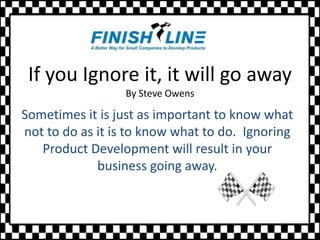If you ignore it, it will go Away (Product Development)
- 1. If you Ignore it, it will go away By Steve Owens Sometimes it is just as important to know what not to do as it is to know what to do. Ignoring Product Development will result in your business going away.
- 2. This may seem like an obvious statement, but it happens much more often to small companies than it should and let me try to explain why. Small companies have very long development cycles. They are not in a hyper competitive world - they are in a niche market.
- 3. In these types of companies, a product is developed and then many years are focused on manufacturing, marketing and servicing the product. During this time, product development is not important. No one is going to spend capital to compete with a niche product that just came on the market as that would only erode margin.
- 4. However, just like the proverbial frog in the slowly boiling pot of water, at some point it will make sense to develop a new product. As technology decreases cost, both developmental and unit cost, the ROI from such an investment gets more and more attractive.
- 5. Eventually, someone launches a more modern product to the niche market, and almost overnight, the old product stops selling. The key is to make sure that someone is you.
- 6. I am not suggesting you drop everything and start designing the next generation of product. In niche markets, product life cycles are long, so the likelihood that you need to develop a new product this year is low. However, the likelihood that you will need to design a new product some year is 100%. So the question is, is it this year?
- 7. Here are a few tips to help make the decision: 1. Set a time each year where product development is formally analyzed. Not making a decision (either yes or no) is a mistake. Half the battle is just making sure “a” decision is made at least once a year.
- 8. 2. Determine the benefits of new technology. Often, an enabling technology can have substantive impact on niche markets. These technologies come from industries outside the niche market, so make sure you are connected to technologist from other industries. Work to keep your technology network as broad as possible.
- 9. 3. What are competitors doing - especially competitors from tangential industries, as they often seem to come out of nowhere. 4. What would a new development cost, and what would the investment bring - that is, calculate the ROI of a new investment and compare and plot the year to year growth. By projecting the rate of growth in this ROI, you can make a rough estimate of when the ROI will be enough to justify the investment and plan for upcoming cash burn.
- 10. 5. Generate a Requirements Document and update it each year. This can usually been done with excess capacity in the organization, and can save months of development schedule. This will also force a discussion about how the industry needs are changing, and how this change affects the product’s requirements.
- 11. You can request a free Requirements Template Here: https://www.finishlinepds.com/tools Finish Line has completed more than 1,500 projects for 275+ companies, creating market- dominating products by combining clients’ ideas and market reach with our talents, team, and processes. We can do the same for you. Best Regards, Steve Owens https://www.finishlinepds.com












